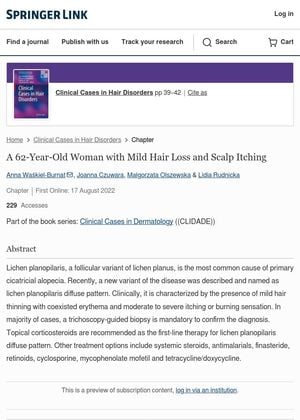A 62-Year-Old Woman with Mild Hair Loss and Scalp Itching
January 2022
in “
Clinical Cases in Dermatology
”

TLDR A 62-year-old woman with hair loss and scalp itching was diagnosed with lichen planopilaris, treated initially with topical corticosteroids, and other possible treatments include systemic steroids, antimalarials, and more.
The document discusses a case of a 62-year-old woman with mild hair loss and scalp itching, diagnosed with lichen planopilaris diffuse pattern, a variant of lichen planus and a common cause of primary cicatricial alopecia. This condition is characterized by mild hair thinning, erythema, and moderate to severe itching or burning sensation. Diagnosis usually requires a trichoscopy-guided biopsy. The first-line therapy for this condition is topical corticosteroids, but other treatments can include systemic steroids, antimalarials, finasteride, retinoids, cyclosporine, mycophenolate mofetil, and tetracycline/doxycycline.






